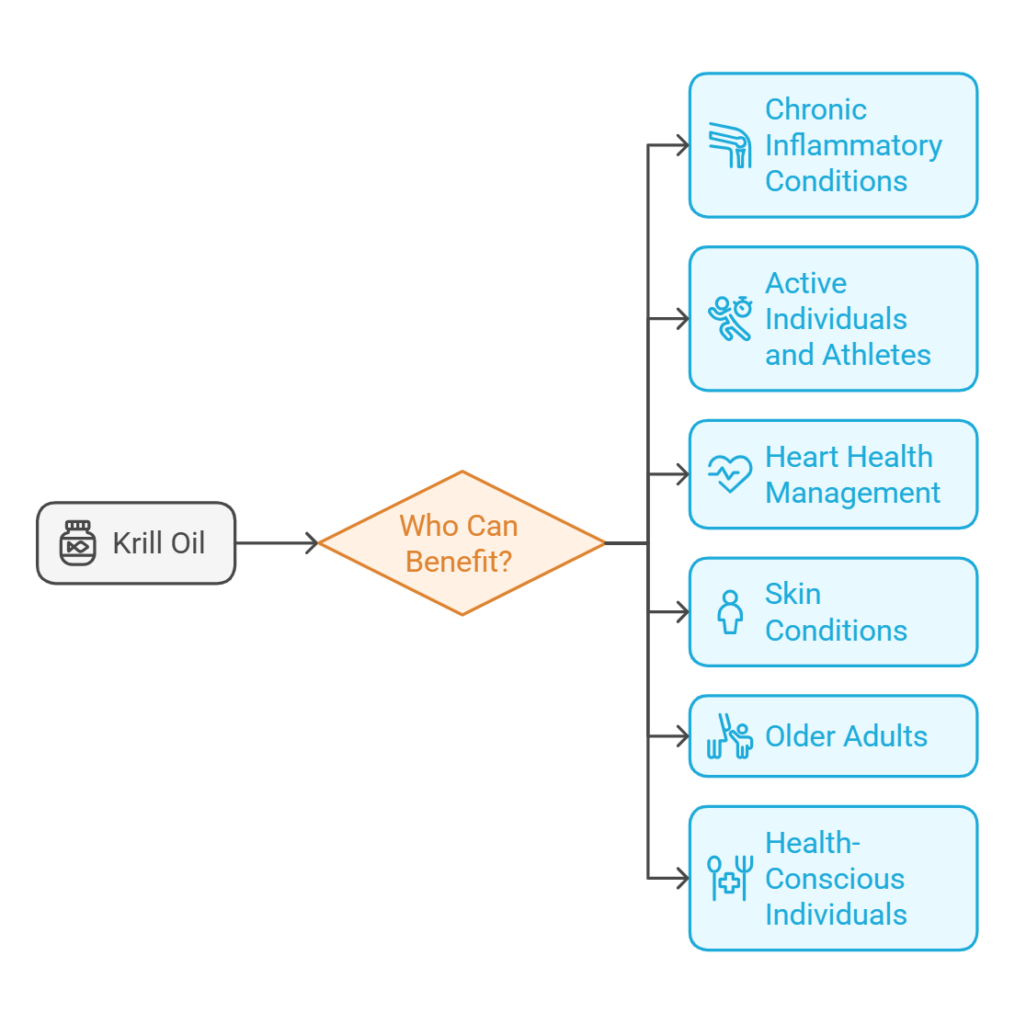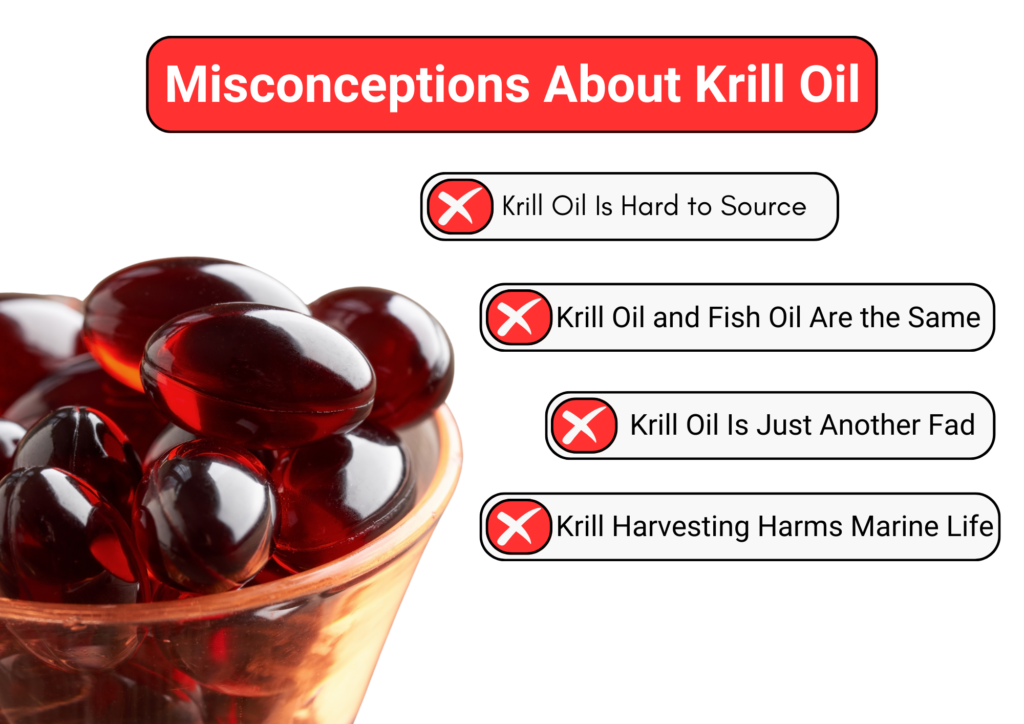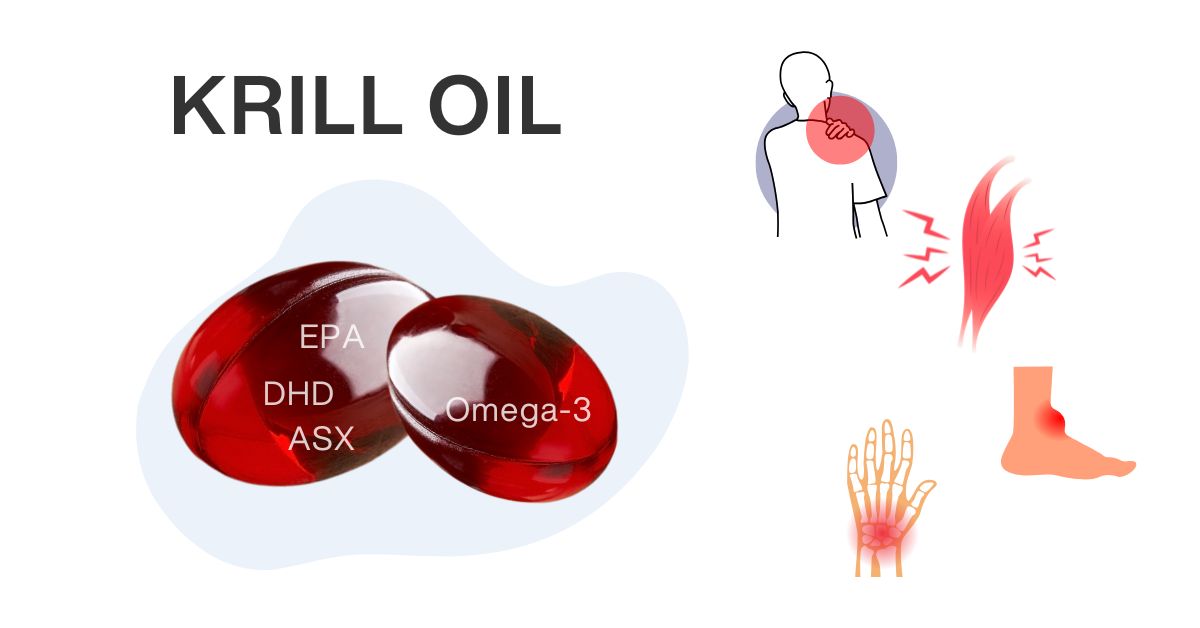Did you know that chronic inflammation is a leading contributor to conditions like arthritis, heart disease, and even fatigue? It’s a silent issue that affects millions, disrupting daily life and long-term health.
Here’s the good news: krill oil offers a natural and effective solution to manage inflammation. Packed with omega-3 fatty acids and the powerful antioxidant astaxanthin, krill oil works at the cellular level to target and reduce inflammation, helping your body heal and function at its best.
In this article, we’ll explore how krill oil fights inflammation, what makes it superior to other options, and why it’s worth adding to your daily routine. So read on to discover how this tiny crustacean can have a big impact on your health.
Understanding Inflammation
Inflammation is your body’s natural defense mechanism, activated to heal injuries and fight infections. This process, marked by redness, swelling, and heat, works to isolate and resolve the issue.
Acute inflammation—like a swollen ankle after a sprain—is beneficial and temporary. However, chronic inflammation is a different story. When the body stays in defense mode without an immediate threat, it starts damaging healthy tissues instead of healing them.
Why Chronic Inflammation is Harmful
Chronic inflammation doesn’t just linger—it quietly contributes to serious health issues like arthritis, heart disease, and autoimmune disorders, where the body mistakenly attacks itself. Over time, it can lead to joint pain, fatigue, and even an increased risk of certain cancers.

What makes it especially dangerous is its subtlety. Unlike acute inflammation, which is visible and uncomfortable, chronic inflammation often remains unnoticed until significant damage has occurred.
Managing inflammation early is crucial, and that’s where krill oil can help. It offers a natural, targeted solution to keep inflammation under control. Let’s explore this in detail in the next sections.
How Krill Oil Reduces Inflammation and Stands Out as a Solution
Krill oil tackles inflammation at its core—within the cells. The omega-3 fatty acids EPA and DHA in krill oil play a key role in regulating the body’s inflammatory response. By interrupting the production of pro-inflammatory molecules, these nutrients help calm an overactive immune system, effectively reducing the risk of chronic inflammation and its associated health issues.
Krill oil’s omega-3s are bound to phospholipids, improving absorption and enabling efficient delivery to inflamed tissues. This unique structure ensures targeted relief by allowing anti-inflammatory compounds to penetrate cell membranes effectively.
Astaxanthin, a potent antioxidant exclusive to krill oil, directly combats oxidative stress—a major driver of chronic inflammation and cellular damage. By neutralizing free radicals, it not only amplifies the anti-inflammatory power of omega-3s but also protects cells from long-term harm, promoting overall resilience and health.
The combination of phospholipid-bound omega-3s and astaxanthin gives krill oil a unique edge over alternatives like fish oil. While fish oil delivers omega-3s in triglyceride form, which requires more processing by the body, krill oil provides immediate and sustained relief. Additionally, astaxanthin stabilizes the omega-3s, preserving their potency and ensuring they remain effective during digestion.
Krill oil doesn’t just reduce inflammation—it works with precision. By targeting specific molecular pathways, it calms overactive immune responses without disrupting other bodily functions. This targeted approach, combined with its superior bioavailability and nutrient synergy, makes krill oil a powerful, natural solution for managing chronic inflammation effectively.
So read on, because there’s more to discover about how krill oil supports your health in ways that go beyond inflammation.
Who Can Benefit from Krill Oil for Inflammation?
Krill oil isn’t just for those already battling inflammation—it’s a versatile supplement that can support a wide range of individuals looking to manage or prevent inflammatory issues.

People with Chronic Inflammatory Conditions
Those suffering from conditions like arthritis, joint pain, or autoimmune disorders may find relief with krill oil. Its ability to regulate inflammatory markers and reduce oxidative stress makes it particularly effective in addressing the root causes of chronic inflammation.
Active Individuals and Athletes
Regular physical activity can lead to inflammation from muscle strain or overexertion. Krill oil helps by reducing inflammation in overworked muscles, speeding up recovery, and supporting overall joint health, making it a great addition to any fitness routine.
Those Managing Heart Health
Chronic inflammation is closely linked to cardiovascular problems. Krill oil’s omega-3s and astaxanthin work together to reduce inflammatory markers, promote healthy blood flow, and protect arterial walls, benefiting anyone focused on maintaining or improving heart health.
Individuals with Skin Conditions
For those dealing with skin inflammation caused by conditions like eczema or rosacea, krill oil’s anti-inflammatory and antioxidant properties can help reduce redness and irritation while supporting overall skin health.
Older Adults
As the body ages, natural inflammatory responses can become overactive, leading to stiffness, pain, or slower recovery. Krill oil offers a natural way to support healthy inflammation levels, making it especially beneficial for older adults looking to maintain mobility and reduce discomfort.
Health-Conscious Individuals
Even if inflammation isn’t a current concern, taking krill oil can act as a preventative measure. By supporting a balanced immune response and reducing oxidative stress, it helps promote long-term wellness and reduces the risk of inflammation-related health issues.
So read on to discover how krill oil can become a vital part of your anti-inflammatory toolkit. But there’s more—let’s dive into the practical ways you can start incorporating it into your daily routine.
How to Incorporate Krill Oil Into Your Routine
Incorporating krill oil into your daily routine doesn’t require a complete lifestyle overhaul. With its versatility and ease of use, it’s simple to start reaping the benefits of this powerful anti-inflammatory supplement.
1. Choose the Right Form
Krill oil is most commonly available in capsule form, making it easy to include in your routine. Opt for high-quality, sustainably sourced products that clearly list omega-3 and astaxanthin content to ensure maximum potency.
2. Pair It with Meals
Taking krill oil with food, particularly meals that contain healthy fats, can improve its absorption. Breakfast is often a great choice—add it alongside avocado toast, eggs, or a smoothie to start your day with an anti-inflammatory boost.
3. Follow the Recommended Dosage
Check the label for dosage recommendations specific to your product. Most people benefit from 1,000–2,000 mg daily, but it’s always a good idea to consult a healthcare provider for personalized advice, especially if you have specific health conditions or take other medications.
4. Set a Consistent Schedule
Consistency is key for optimal results. Whether you take it in the morning or evening, making krill oil a part of your daily routine ensures its anti-inflammatory compounds remain active in your system. Consider setting a reminder or pairing it with another daily habit to avoid missing doses.
5. Combine with a Balanced Diet
For best results, pair krill oil supplementation with a diet rich in whole foods like fruits, vegetables, lean proteins, and whole grains. This holistic approach amplifies its benefits by reducing overall inflammation triggers in your diet.
6. Monitor Your Progress
Pay attention to changes in your health after incorporating krill oil. Whether it’s reduced joint pain, better recovery from workouts, or improved energy levels, tracking your progress can help you fine-tune your routine and reinforce the habit.
Addressing Misconceptions About Krill Oil
Krill oil’s growing popularity has sparked curiosity—and with it, a few misconceptions. Let’s clear up some common misunderstandings to help you make informed decisions about this natural powerhouse.

Krill Oil Is Hard to Source
Some believe that krill is scarce or difficult to harvest sustainably. In reality, krill is one of the most abundant species on the planet, found primarily in the pristine waters of Antarctica. Strict regulations and advanced harvesting practices ensure that krill populations remain healthy and their ecosystems protected. Choosing certified sustainable krill oil products further supports these efforts.
Krill Oil and Fish Oil Are the Same
While both are rich in omega-3s, krill oil stands out for its superior absorption due to its phospholipid-bound structure. This unique feature ensures that omega-3s are delivered directly to cells, maximizing their benefits. Additionally, krill oil contains astaxanthin, an antioxidant absent in fish oil, which helps preserve its potency and offers added health benefits.
Krill Oil Is Just Another Fad
Skeptics might dismiss krill oil as a passing trend, but scientific research proves otherwise. Its anti-inflammatory and antioxidant properties have been widely studied, solidifying its position as a reliable supplement for long-term health. Unlike fleeting health crazes, krill oil has a robust foundation of evidence supporting its effectiveness.
Krill Harvesting Harms Marine Life
Some worry that krill harvesting negatively impacts marine ecosystems. However, krill fisheries are among the most carefully managed in the world, with stringent quotas and eco-friendly practices that protect marine biodiversity. Leading organizations, such as the Marine Stewardship Council (MSC), certify krill products to ensure sustainability.
So now that we’ve debunked these myths, let’s dive into the practical benefits krill oil can bring to your health and well-being. Stick around—there’s more to discover!
Conclusion
Krill oil offers a natural and efficient way to manage inflammation and improve overall health, thanks to its potent omega-3s and antioxidant-rich astaxanthin. From reducing joint pain to supporting heart and brain health, its unique nutrient profile provides targeted and lasting benefits for your well-being.
While krill oil is a fantastic supplement, krill meat is another nutrient-dense option worth exploring. Packed with the same beneficial omega-3s and high-quality protein, it’s a wholesome addition to your diet. Consider incorporating krill meat into your meals as a delicious and sustainable way to support your health naturally.
FAQs
How Fast Does Krill Oil Work for Inflammation?
Krill oil may start reducing inflammation within a few weeks of consistent use, though noticeable improvements in joint pain or mobility might take 2-3 months. Its omega-3 fatty acids and astaxanthin work gradually to combat inflammation at the cellular level, promoting long-term benefits with regular intake.
Which Omega Is Best for Inflammation?
Omega-3 fatty acids, particularly EPA and DHA, are the most effective for reducing inflammation. These are found in krill oil, fish oil, and some plant sources. EPA directly helps lower inflammatory markers, while DHA supports overall cellular health, making them key for managing inflammation.
How to Reduce Inflammation in the Body?
To reduce inflammation, focus on an anti-inflammatory diet rich in omega-3s (from krill oil or fatty fish), antioxidants (fruits and vegetables), and whole grains. Limit processed foods, refined sugars, and trans fats. Regular exercise, stress management, and adequate sleep also play crucial roles in lowering inflammation.
Is 500 mg Krill Oil Enough?
500 mg of krill oil can be sufficient for general health benefits, including mild inflammation support. However, for managing more severe inflammation or specific health conditions, higher doses may be recommended. Consult your healthcare provider for personalized dosage advice.
What Happens When You Take Omega-3,6,9 Every Day?
Taking omega-3,6,9 daily can support overall health by balancing inflammation, improving heart health, and supporting brain function. However, omega-6 is already abundant in most diets, so excessive intake can increase inflammation. Focus on omega-3-rich sources like krill oil to maintain the right balance.








